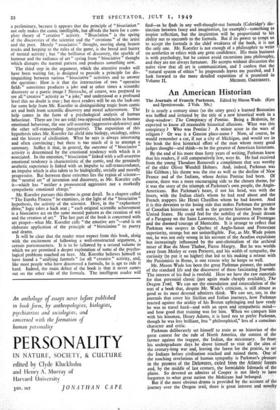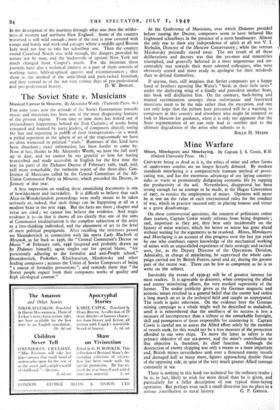An American Historian
The Journals of Francis Parkman. Edited by Mason Wade. (Eyre and Spottiswoode. 2 Vols. 50s.)
IT is nearly a century since (so the story goes) a learned Bostonian was baffled and irritated by the title of a new historical work in a shop-window: The Conspiracy of Pontiac. Being a Brahmin, he expected to know all reasonable historical allusions. What was this conspiracy ? Who was Pontiac ? A minor actor in the wars of religion ? Or was it a Gascon place-name ? Now, of course, he would remember a car, if not a city of Michigan, and would see in the book the first historical effort of the man whom many good judges thought—and think—to be the greatest of American historians.
By the end of his more than forty years of writing, Parkman knew that his readers, if still comparatively few, were fit. He had received from the young Theodore Roosevelt a compliment that was worthy of the elder Oliver Wendell Holmes. And, indeed, Parkman was like Gibbon ; his theme was the rise as well as the decline of New France and of the Indians, whose Aetius Pontiac had been. Of course, there was a more encouraging side to the chosen theme, for it was the story of the triumph of Parkman's own people, the Anglo- Americans. But Parkman's heart, if not his head, was with the losers, with the Indian chiefs whom he had read about and the French trappers like Henri Chatillon whom he had known. And it is this devotion to the losing side that makes Parkman the greatest of Canadian historians as well as the greatest historian born in the United States. He could feel for the nobility of the Jesuit dream of a Paraguay on the Saint Lawrence, for the greatness of Fronteilac and the doomed•courage of Montcalm. It is strange to reflect that Parkman was suspect in Quebec of Anglo-Saxon and Protestant superiority, strange but not unintelligible. For, as Mr. Wade points out, he was not only wrong in his account of the Acadian expulsions but increasingly influenced by the anti-clericalism of the archival miser of Rue du Mont Thabor, Pierre Margry. But he was worlds away from Motley or even Prescott, and his width of sympathy, the curiosity (to put it no higher) that led to his making a retreat with the Passionists in Rome, is one reason why he keeps so well.
Mr. Mason Wade has been the great Parkman pioneer, the author of the standard life and the discoverer of these fascinating Journals. The interest of his find is twofold. Here we have the raw materials for that perennial classic (just again made cheaply available), The Oregon Trail. We can see the emendation and emasculation of the text of a book that, despite Mr. Wade's criticism, is still almost as good as its most devoted admirers think. We can see, too, in the journals that cover his Sicilian and Italian journeys, how Parkman reacted against the aridity of his Boston upbringing and how ready he was to travel hard—and with an open and sympathetic mind— and how good that training was for him. When we compare him with his kinsman, Henry Adams, it is hard not to prefer Parkman, though he was less brilliant, less " philosophical," less of a conscious character and critic. - Parkman deliberately set himself to train as an historian of the great contest for the rule of North America, the contest of the farmer against the trapper, the Indian, the missionary. So from his undergraduate days he drove himself to visit all the sites of the century-long war and, leaving the forest for the prairie, to see the Indians before civilisation reached and ruined them. One of the touching revelations of human sympathy is Parkman's pleasure in the prowess of the Delawares, exiled from the Atlantic forests and, by the middle of last century, the formidable Ishmaels of the plains. So devoted an admirer of Cooper is not likely to have forgotten to what great nation the Mohicans had belonged.
But if the most obvious drama is provided by the account of the journey over the Oregon trail, there is great interest and novelty in the description of the journeys through what was then the wilder- ness of western and northern New England. Some of the country traversed is still wild enough ; most of the rest is now covered with camps and hotels and week-end cottages where a middle-aged Boston lady need not fear to take her schoolboy son. Then the country round Crawford Notch was wild enough, the dangers provided by nature not by man, and the backwoods of upstate New York not much changed from Cooper's youth. For the historian these journals have also a technical interest as a part of them consists of working notes, bibliographical queries and reconnaissances ; they show us the method of the semi-blind and pain-racked historian, and they remind us of the not very remote days of pre-professional







































 Previous page
Previous page